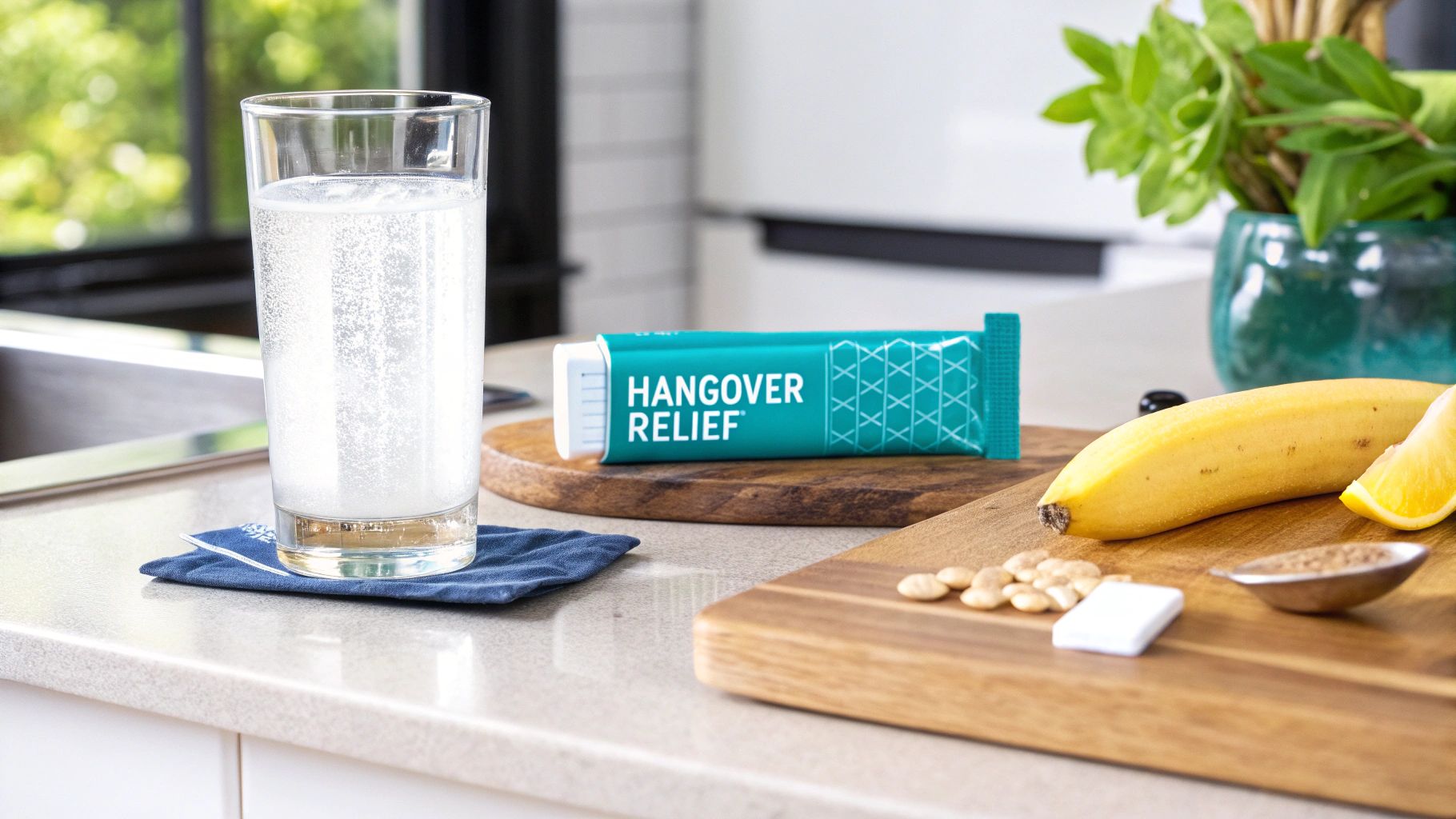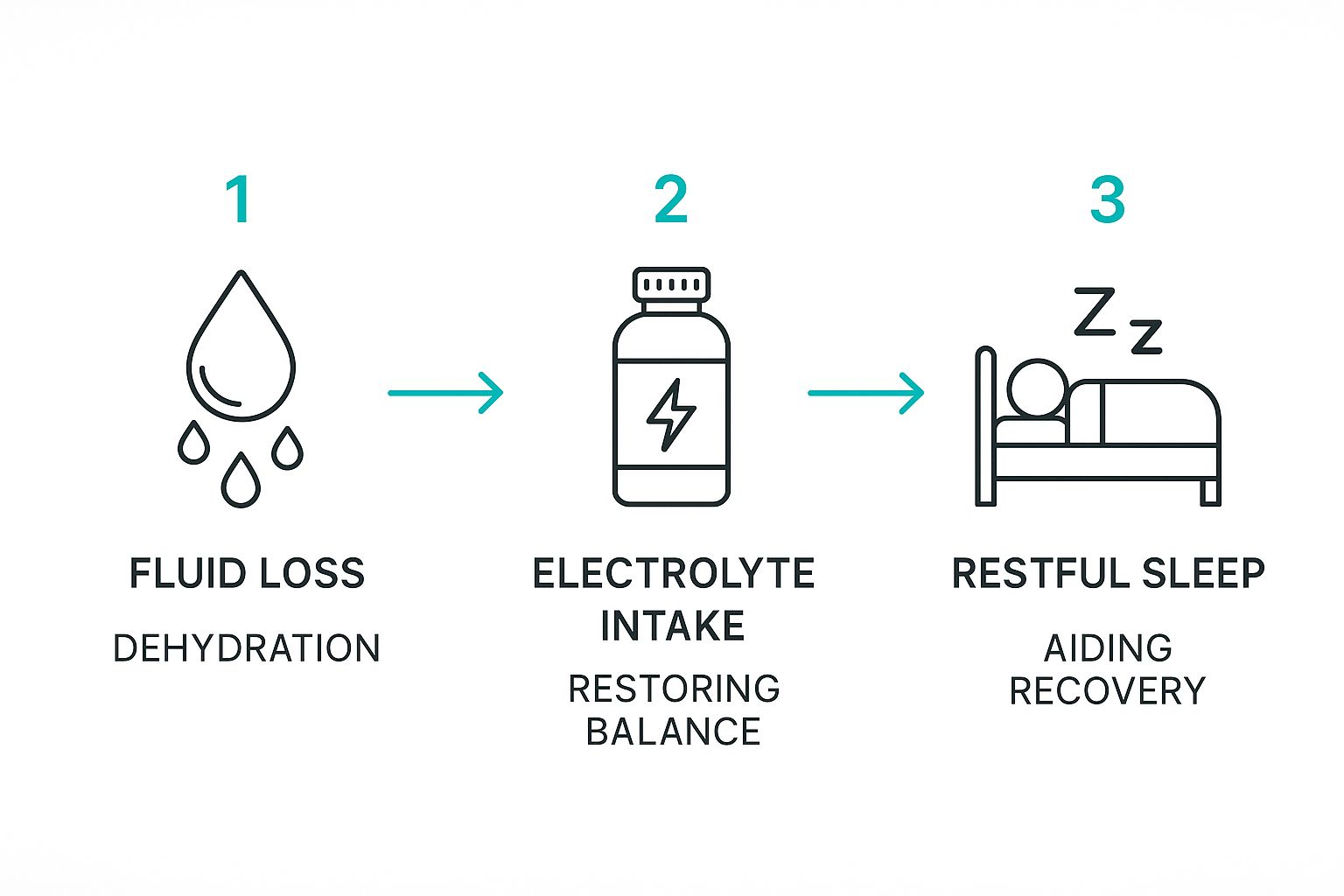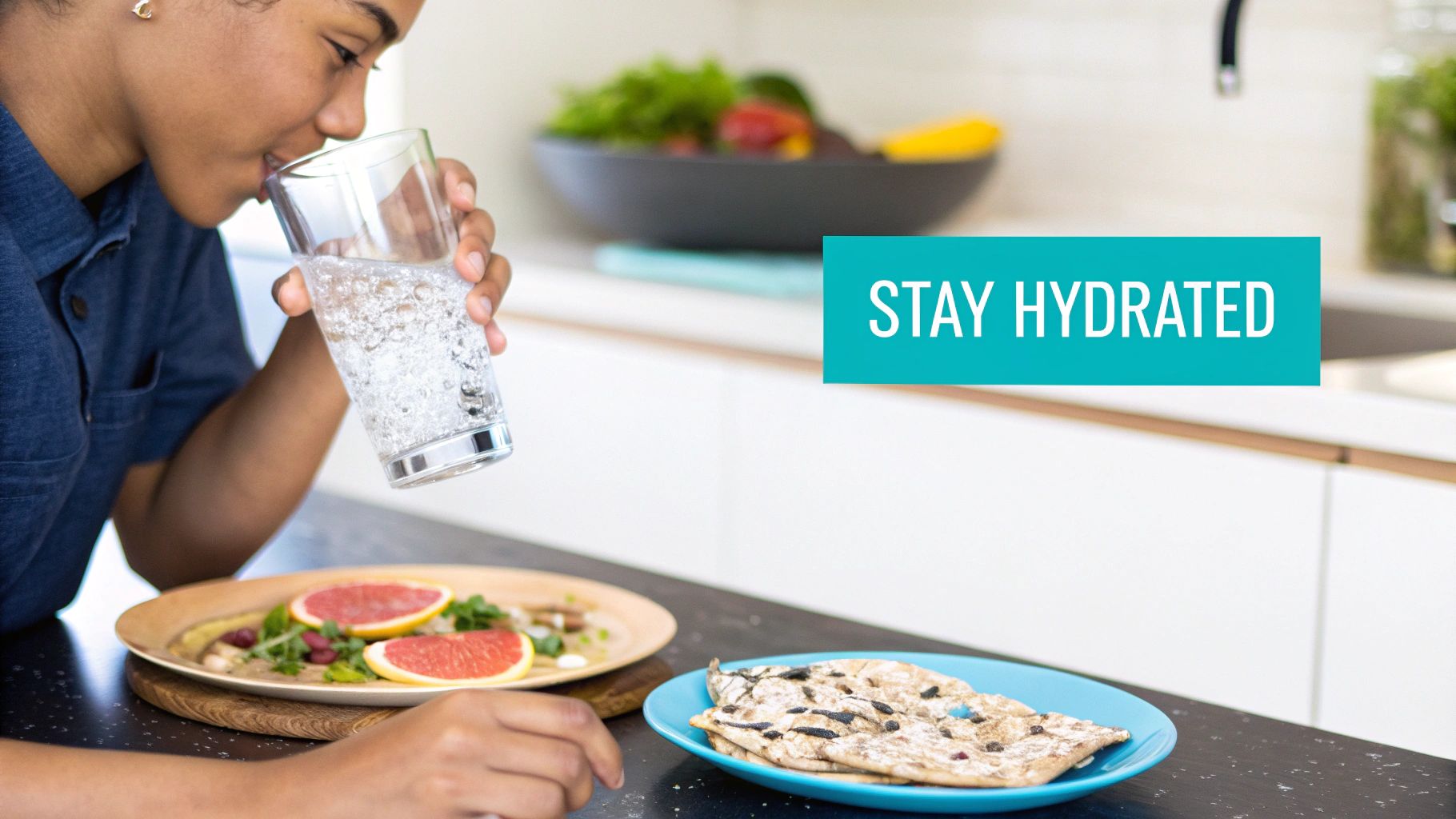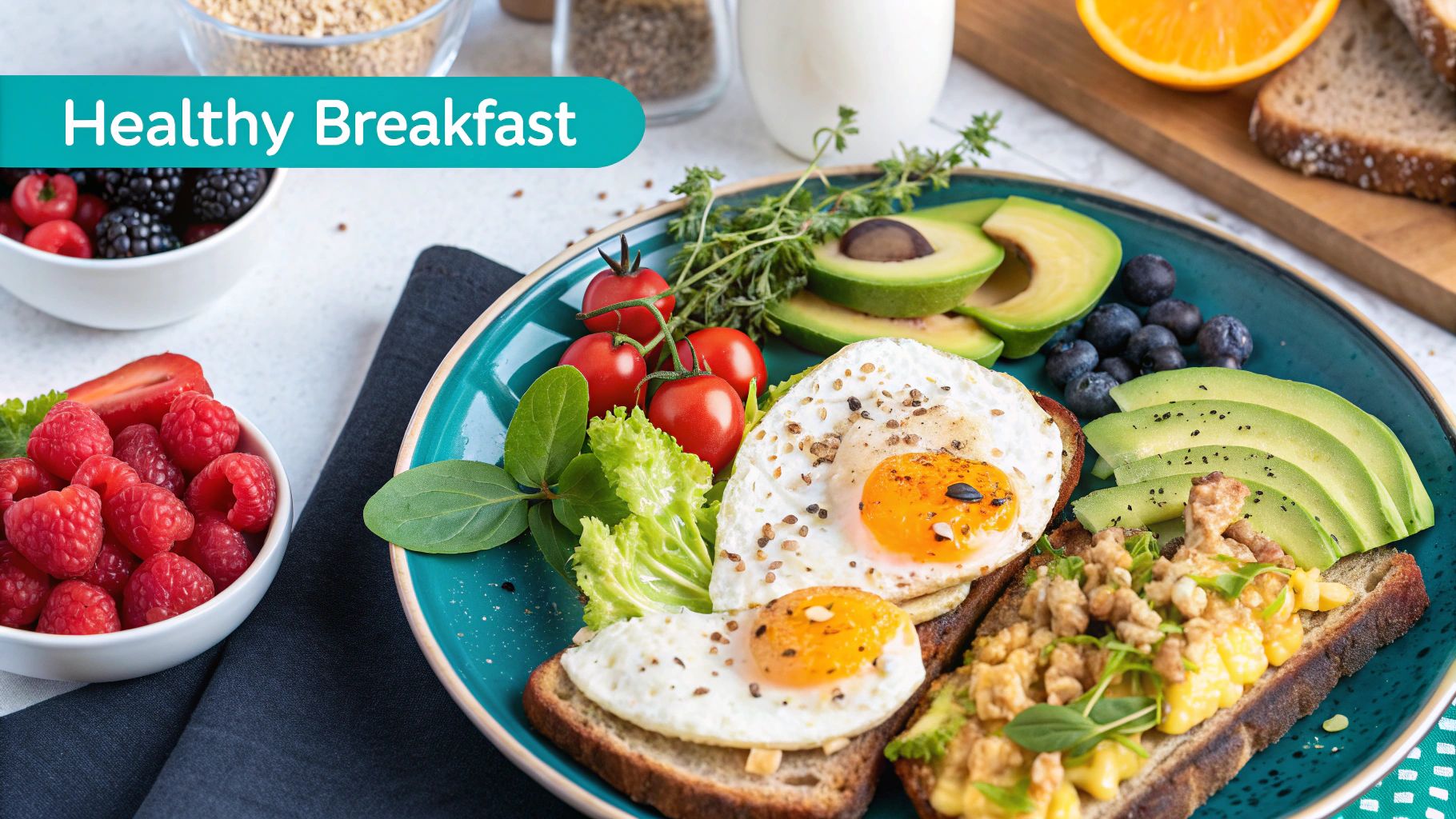

· By Annemarie
How to Relieve a Hangover Fast
That gut-wrenching moment you first open your eyes. The pounding head, the queasy stomach, the feeling that you’ve been run over by a truck. We've all been there. It’s a brutal start to any day, but what you do in those first few minutes can make all the difference.
The fastest way to start feeling human again is by going straight for the two biggest culprits: dehydration and a blood sugar crash. Getting this one-two punch right from the get-go is your best shot at turning the day around.
Your Morning After Action Plan
Instead of stumbling around the kitchen in a fog, wondering if pickles or coffee is the answer (hint: probably not), you need a clear, immediate plan. Your body is practically screaming for help, and responding correctly is everything.
The first, most critical mission is to tackle the gnarly dehydration. Alcohol is a diuretic, which is just a scientific way of saying it makes you pee—a lot. As you lose water, you're also flushing out essential minerals. This is exactly why chugging plain water often doesn't cut it. You might feel less thirsty, but you’re still missing the electrolytes your body needs to actually balance its fluids and get your nerves firing properly again.
Prioritize Fluids and Electrolytes
Think of it as a rescue mission for your body. Your job is to rehydrate and replenish what you’ve lost. This means looking beyond the tap.
- Electrolyte Drinks: These are formulated to quickly restore vital minerals like sodium, potassium, and magnesium.
- Targeted Supplements: Something like an Upside Hangover Stick is a fantastic shortcut. It gives you a concentrated dose of electrolytes and other helpful ingredients designed for exactly this situation.
- Coconut Water: If you have it in the fridge, it's a great natural source of potassium and other electrolytes.
This is all about getting back the balance that alcohol so rudely disrupted.

As you can see, it's a simple flow: alcohol depletes you, so you need to actively restore your system with more than just water.
When you're feeling awful, knowing exactly what to do can feel overwhelming. Here’s a quick checklist to make those first moments a little easier.
Immediate Hangover Relief Checklist
This table breaks down the very first actions to take upon waking up to tackle hangover symptoms head-on.
| Action Item | Why It Works | Quick Tip |
|---|---|---|
| Drink an Electrolyte Mix | Replaces lost minerals like sodium and potassium that water alone can't provide, which is key for rehydration. | Mix an Upside Hangover Stick into a glass of water for a fast, concentrated dose. |
| Eat Simple Carbs | Alcohol tanks your blood sugar, causing weakness and fatigue. Simple carbs provide quick, easy-to-digest energy. | A banana or a piece of plain toast is perfect. Avoid anything heavy or greasy for now. |
| Avoid "Hair of the Dog" | Drinking more alcohol only delays the inevitable and can make the eventual crash even worse. | Stick to non-alcoholic fluids. Your liver has enough to deal with already. |
This checklist isn't magic, but it's a solid, science-backed foundation for starting your recovery on the right foot.
Settle the "Should I Eat" Debate
The thought of food might make your stomach churn, but your body desperately needs fuel. Alcohol makes your blood sugar levels plummet, which is a major reason you feel so weak, irritable, and completely wiped out. The trick is choosing your food wisely.
A greasy, heavy breakfast is the last thing your sensitive digestive system needs. Instead, go for simple, stomach-friendly foods that offer sustained energy without making you feel more nauseous.
Focus on things that are easy to digest and will help gently bring your blood sugar back to a normal level. Think a piece of whole-wheat toast, a small bowl of oatmeal, or a banana. They give you the carbohydrates you need without overwhelming your system. This strategic approach to fluids and food is your quick-start guide to taking back your morning.
Strategic Rehydration and Electrolyte Balance
We’ve all been there. That throbbing headache and the dizzy feeling that makes getting out of bed feel like a monumental task. A huge part of that misery comes from dehydration, but it’s a bit more complicated than just not drinking enough water.
Alcohol is a diuretic, which is a fancy way of saying it makes you pee—a lot. As your body flushes out all that liquid, it also loses vital minerals called electrolytes. This is why chugging a liter of water might help your dry mouth but won't magically cure the rest of your symptoms. Your body is screaming for minerals like potassium, sodium, and magnesium to get its internal wiring back online. Nailing this part is probably the most important thing you can do to feel human again.

Why Water Alone Is Not Enough
Think of your body like a complex electrical circuit. Electrolytes are what allow the current to flow properly. When you’re hungover and depleted, just adding plain water is like trying to run a device with a weak battery. You need to recharge the system with the right minerals.
These electrolytes are the unsung heroes of feeling good. They’re absolutely essential for:
- Nerve Function: They help carry signals between your brain, heart, and muscles. That brain fog? Yep, electrolyte imbalance plays a part.
- Muscle Contraction: If you’re feeling weak, shaky, or crampy, it's often because your muscles don't have the electrolytes they need to work properly.
- Hydration: Sodium is especially important because it helps your body actually absorb and hold onto the water you’re drinking.
Without electrolytes, you're only fighting half the battle. This is why learning how to relieve a hangover for real means looking past the kitchen tap.
This isn't just anecdotal wisdom anymore—it's big business. The market for hangover rehydration supplements is expected to skyrocket to USD 5.32 billion by 2030, growing at a rapid 15.0% each year. People are catching on that targeted solutions are the way to go. You can read more about the hangover supplement market on GlobeNewswire.
Choosing Your Rehydration Weapon
When it comes to getting those electrolytes back in your system, you’ve got a few options. Each has its own set of pros and cons, especially when you’re feeling less than 100%.
| Rehydration Source | The Good | The Not-So-Good |
|---|---|---|
| Sports Drinks | Easy to find. They have sodium and potassium. | Often loaded with sugar and artificial junk that can make a queasy stomach worse. |
| Coconut Water | A great natural source of potassium. | Can be an acquired taste and is lower in sodium than what you really need. |
| Hangover Supplements | Specifically formulated with the right blend of electrolytes for recovery. | A bit pricier and you have to plan ahead to have them on hand. |
| DIY Electrolyte Drink | Cheap, and you know exactly what’s in it. | Requires you to have the ingredients and the energy to mix it up when you feel awful. |
If you’re a do-it-yourself kind of person, a homemade mix can work in a pinch. Just stir a pinch of salt (for sodium), a little sugar or honey (to help absorption), and a squeeze of lemon or orange juice (for potassium) into a glass of water. For a deeper dive, you can learn more about the best way to rehydrate after drinking in our guide.
Honestly, the best choice is whatever you can get your hands on that gives your body what it’s crying out for. From experience, a specialized product like an Upside Hangover Stick is the most efficient path. It’s designed to deliver a concentrated, balanced formula without any guesswork, tackling the root of your misery and getting you back on your feet faster.
Fueling Your Recovery with Smart Nutrition

Okay, you’ve started chugging water. Good. But the next frontline in your hangover battle is right in your kitchen. What you decide to eat can either fast-track your recovery or send you right back to bed, feeling a whole lot worse.
Let’s bust the old myth right now: a greasy fry-up is not the answer. Your system is already working overtime, so the last thing it needs is more stress.
When you drink, your body torches through essential nutrients, and your blood sugar levels take a serious nosedive. This is a huge reason you feel so weak, cranky, and utterly exhausted. The right foods can bring you back from the brink, stabilizing your energy and helping your body process all those leftover toxins.
Your Hangover Recovery Menu
Forget about whipping up some complicated, heavy meal. The goal here is simple: find foods that are gentle on your stomach but loaded with the nutrients your body is practically screaming for.
Think of it as a strategic resupply mission for your depleted system. A solid recovery plate should have a mix of these:
- Complex Carbs: These are your best bet for a slow, steady release of energy to fight that blood sugar crash. A bowl of oatmeal or a simple slice of whole-wheat toast will do the trick.
- Lean Protein: Eggs are your absolute best friend right now. They’re packed with an amino acid called L-cysteine, which gives your body a direct assist in breaking down acetaldehyde—the nasty, toxic compound behind most of your hangover woes.
- Potassium-Rich Foods: Alcohol is a diuretic, meaning you lose a ton of key electrolytes like potassium. To combat that shaky, weak feeling in your muscles, grab a banana, some avocado, or a handful of spinach.
This simple combo gives your body a real fighting chance. Of course, the best strategy is playing offense. For a more proactive approach, check out our guide on how to avoid a hangover which has tips for prepping your body before you even take that first sip.
Foods to Avoid When Hungover
Just as important as what you eat is what you don’t eat. Some foods will just make things worse, dragging out your recovery.
When your stomach is already touchy and your liver is putting in a double shift, please don't throw a greasy, fatty meal at it. You’re just asking for indigestion and another wave of nausea, which sets you way back.
Here’s a quick list of what to stay away from:
- Greasy, Fatty Foods: Step away from the bacon, burgers, and pizza. They’ll only irritate your stomach.
- Acidic Foods: A glass of OJ might seem like a healthy choice, but its high acidity can make an upset stomach even angrier. Same goes for tomato juice.
- More Alcohol: Don't fall for the "hair of the dog." It’s a complete myth that only delays the inevitable crash and puts even more strain on your already overworked liver.
The Role of Targeted Supplements
Beyond food, targeted supplements can give you a concentrated dose of exactly what your body needs. Alcohol is notorious for depleting B vitamins, which are absolutely critical for producing energy and keeping your brain functioning properly. Antioxidants are also a huge help in fighting the oxidative stress that drinking causes.
An all-in-one supplement, like an Upside Hangover Stick, is a smart shortcut. It efficiently delivers these key ingredients without you having to stomach a full meal, helping you feel better, faster. When you pair smart nutrition with strategic hydration, you create a seriously powerful one-two punch for hangover relief.
The Power of Rest and Gentle Movement
Okay, so you've started chugging water and found something to eat. That’s a great start. But there's another piece of the puzzle that most people try to skip: actually giving your body a break.
I know the feeling. You wake up, feel terrible, and immediately your brain starts screaming, "You have things to do!" The temptation to just "power through it" is real, but trust me, it almost always backfires and just makes you feel awful for longer.
Alcohol absolutely wrecks your sleep architecture. Even if you passed out for a solid eight hours, it wasn't the good stuff. It wasn't that deep, restorative sleep your body and brain crave. Alcohol is notorious for suppressing REM sleep, which is critical for feeling mentally sharp. That's why you still feel so foggy and exhausted, no matter how long you were horizontal.
Seriously, Get Some Quality Rest
Trying to fight a hangover is a lot like trying to recover from the flu. Your body is working overtime, dealing with toxins, trying to rebalance everything, and generally cleaning up the mess you made. Pushing through it is asking for trouble.
This is where a strategic nap can be a game-changer. I’m not talking about just crashing on the couch with Netflix droning on in the background. You need to create an environment that encourages real rest.
- Go dark: Blackout curtains are your best friend. If you don't have them, an eye mask works wonders. Light can make a hangover headache so much worse.
- Embrace silence: Mute your phone notifications. Seriously. Use earplugs or find a white noise app if you need to drown out the world.
- Get comfy: A cool, comfortable room is key. Every little detail helps your body finally unclench and relax.
Even a quick 20 or 30-minute nap in the right setting can make a world of difference for your energy and focus. It’s the perfect little reset button, giving your system a chance to catch up on the quality rest it missed out on.
Your body is in the middle of a serious detox. Forcing it to do anything demanding is like telling someone with the flu to go run a marathon. It’s just going to make everything worse. Rest isn’t lazy—it’s a strategy.
Find Your Balance with Gentle Movement
While a hardcore workout is probably the worst idea you could have, lying in bed like a corpse all day isn't always the answer either. Sometimes that just makes you feel more stiff, groggy, and stuck in your misery.
The sweet spot is gentle movement.
This is not an invitation to hit the gym. Not at all. We’re talking about light activities that get your blood flowing without putting any more stress on your already overworked system.
- A Slow Walk: A short, 15-minute walk around the block can be incredible. A little fresh air often helps with nausea, and the movement boosts your circulation, which helps your body clear out those toxins a bit faster.
- Light Stretching: Think simple, static stretches. The kind that feels good. This can ease the muscle aches and stiffness that hangovers love to bring. Just avoid anything intense like a hot yoga class—that’s a recipe for disaster.
The goal here isn't to burn calories or get a workout in. It's simply to get things moving and maybe release a few natural, mood-boosting endorphins. A little bit of light activity can lift your spirits and make you feel human again, without draining what little energy you have left. It’s all about listening to your body and finding that perfect balance between rest and recovery.
Using Smart Supplements for Targeted Relief

While hydrating and eating well are the cornerstones of feeling human again, sometimes your body needs a more direct line of support. This is where scientifically formulated supplements come in. Think of them as a powerful ally, delivering a concentrated dose of the specific compounds your body is screaming for.
It’s not about finding some magic pill that erases a night of fun. It’s about being smarter with your recovery. Instead of trying to eat a whole bunch of bananas for potassium, a good supplement can give you that mineral—and more—efficiently.
There's a reason the hangover cure market is booming. Valued at USD 2.34 billion in 2023, it's expected to climb to a whopping USD 6.18 billion by 2030. That tells you people are actively looking for products that do more than just mask the headache; they want something that genuinely helps their body bounce back.
What’s Actually in These Things?
Not all supplements are created equal. The ones that really work are packed with specific, science-backed ingredients designed to tackle the root causes of your misery.
Here’s a look at the heavy hitters:
- Dihydromyricetin (DHM): This plant extract is the undisputed star of the show. It helps your liver break down alcohol more effectively and reduces the impact of acetaldehyde—that nasty toxin largely responsible for making you feel awful.
- L-Glutamine: A night of drinking can be rough on your gut. L-Glutamine is an amino acid that helps soothe and protect your digestive system, which can go a long way in easing that queasy stomach feeling.
- Concentrated Electrolytes: We've already talked about how vital electrolytes like sodium and potassium are. A quality supplement provides these in a balanced formula that helps you rehydrate much faster than guzzling plain water.
A common question is when to take a supplement. Some people swear by taking them before bed to get ahead of the misery. Others find taking them first thing in the morning works best. Honestly, it often comes down to the specific product and your own body.
Putting It All Together
Let's get practical. Imagine you’re rolling in late from a friend's wedding reception, knowing the morning is going to be a struggle. This is the perfect time to be proactive.
Taking something like an Upside Hangover Stick before you crash gives your body a head start on processing everything. This simple step is one of the top quick hangover fixes to feel better fast and can make a world of difference.
Forgot to take one the night before? No worries. Tearing one open as soon as you wake up can kickstart your recovery. Pair it with a big glass of water, and you’re giving your system the targeted nutrients and hydration it’s so desperate for. It’s a smarter way to get back on your feet without sacrificing your entire day.
Got Questions About Hangovers? We’ve Got Answers.
When you’re staring at the ceiling after a big night out, you’ll hear all sorts of conflicting advice. Everyone’s got that one “miracle cure” they swear by, but let's be real—a lot of it is just myth. It's time to cut through the noise and get some straight answers so you can recover smarter, not harder.
The biggest myth we need to tackle right away is the old "hair of the dog." It might feel like a good idea to have another drink to quiet the pounding in your head, but it's a trap. All you're doing is putting more stress on your already overworked liver and delaying the inevitable. You're just kicking the can down the road, and trust me, that hangover will come roaring back even worse later.
So, What About That "Hair of the Dog" Trick?
Why does it feel like it works for a minute, then? It’s because alcohol is a depressant, and it has a numbing effect on your nervous system. That morning-after drink can temporarily mask the misery, giving you a short-lived sense of relief.
But your body still has to metabolize all the alcohol from the night before. Throwing more into the mix just drags out the recovery process. Instead of reaching for another beer, grab a glass of water and an electrolyte stick. That's how you address the real culprits: dehydration and lost minerals.
How Long Is This Misery Going to Last?
This is the question on everyone's mind when they're in the thick of it. For most of us, a hangover can stick around for up to 24 hours. But how long and how bad it gets really depends on a few personal factors.
- How much you drank: This one's pretty simple. The more you drank, the more toxins your body has to clear out, meaning a longer and rougher morning.
- Your own body: Everyone processes alcohol differently. Your genetics, age, and general health all play a part in how quickly your liver can get its job done.
- What you ate (or didn't): If you drank on an empty stomach or forgot to drink water, you've basically set yourself up for a world of hurt.
The honest truth? You have to be patient with your body. There’s no magic button, but you can definitely make those 24 hours a lot more bearable by hydrating properly and getting some real rest.
Can I Prevent This From Happening Again?
Absolutely. The best way to deal with a hangover is to not get one in the first place. A little planning goes a long way and can make a huge difference for your future self.
Think of it as setting yourself up for success. Just a few simple moves before and during your night out can seriously dial down the next day's pain.
- Eat a real meal first. Food, especially meals with some fat and carbs, helps slow down how quickly your body absorbs alcohol. Never, ever drink on an empty stomach.
- Hydrate as you go. This is a game-changer. For every alcoholic drink, have a glass of water. It’s an easy way to fight off alcohol’s dehydrating effects right from the start.
- Go for lighter spirits. Darker liquors like whiskey and red wine have more congeners, which are compounds known to make hangovers feel way worse. Clear spirits like vodka or gin are usually a gentler option.
There’s a reason the market for hangover rehydration supplements is blowing up right now, especially with health-conscious millennials and Gen Z. People are looking for easy, fast-acting formats like effervescent tablets and ready-to-drink shots. If you're curious, you can discover more insights about hangover supplement market trends on Fact.MR. At the end of the day, it's a combination of smart choices and proactive support that offers the best defense.
Don't let the fear of a hangover hold you back from a good time. With Upside Hangover Sticks, you have a convenient, science-backed tool to help you bounce back faster. Keep one in your pocket and enjoy your night, knowing you’ve got support for a better morning. Visit enjoyupside.com to stock up!
